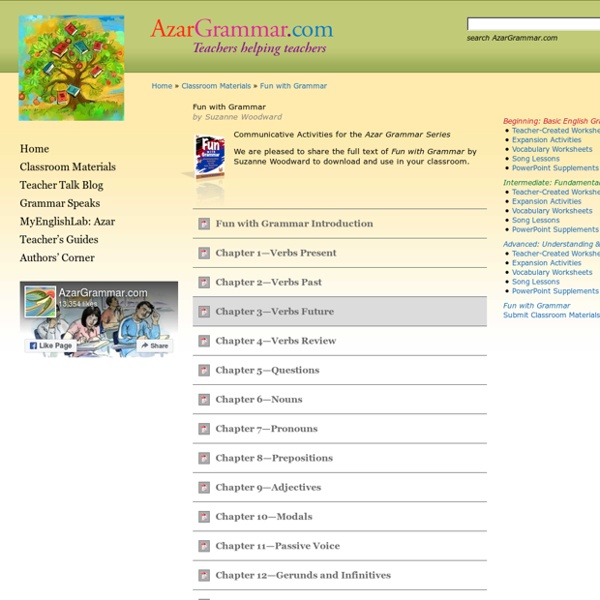



http://www.azargrammar.com/materials/FWG_TOC.html
Related: grammar • angelacroixGrammar : I should - I shouldn't Explanations : Ought to & Should - explication en français et exemples (e-anglais.com) Examples : Rules for the students and Rules for the teacher - Examples (mrstoutsblog.blogspot.com) Cards : Stereotypes - The perfect European should be ways to finish a lesson – so that the students take something away with them There are lots of ways to start off a lesson beautifully, maningfully, logically, etc. For example, to talk about how your students spent their week (here are 2 worksheets to help), or to ask about their plans, or to discuss the weather/ news, or to remember vocabulary from the previous lesson in some creative way, or to revise some grammar, like here or here, or….well, the list is almost inexhaustible, as I am sure you know). But how do we finish a lesson? “the homework is on page 5, thanks, see you on Wednesday”? Well, it’s possible and it happens all the time.
Elementary Tests - PET / KET Practice GrammarBank.com Menu Elementary TestsKET / PET Practice Here you will find easy grammar worksheets with short questions covering basic grammar rules, basic vocabulary, short readings for beginners. Free Online Lessons in English Grammar, Vocabulary and Phrases Select an exercise below to practise your grammar, vocabulary and use of phrases. They are organised into three levels: Elementary: suitable for students from levels A2 to B1 on the CEF (Common European Framework) Intermediate: suitable for students from B1 to B2 on the CEF Advanced: suitable for students from C1 and C2 on the CEF
Conversation Questions for the ESL/EFL Classroom If this is your first time here, then read the Teacher's Guide to Using These PagesIf you can think of a good question for any list, please send it to us. Home | Articles | Lessons | Techniques | Questions | Games | Jokes | Things for Teachers | Links | Activities for ESL Students Would you like to help? If you can think of a good question for any list, please send it to us. If you would like to suggest another topic, please send it and a set of questions to begin the topic. Copyright © 1997-2010 by The Internet TESL Journal Pages from this site should not be put online elsewhere.Permission is not required to link directly to any page on our site as long as you do not trap the page inside a frame.
English grammar resources Do you have a question about the correct usage of the semi-colon or how to place relative adverbs in a sentence? If so, you've come to the right place! The edufind.com English grammar guide is a complete reference on the rules of English usage. Every grammatical rule is explained in clear, simple language with several examples and, when necessary, counter-examples. ESL Treasure HintsConceal a card or piece of paper with a word written on it from the students. Give them 3 hints as to what the word is i.e. 1. I am very big 2. I’m an animal 3. I’m gray (word=elephant). Reported speech We use reported speech when we want to tell someone what someone said. We usually use a reporting verb (e.g. say, tell, ask, etc.) and then change the tense of what was actually said in direct speech. So, direct speech is what someone actually says? Like 'I want to know about reported speech'? Yes, and you report it with a reporting verb. He said he wanted to know about reported speech.
English Language Resources from Macmillan Dictionary We frequently create unique English language resources from our dictionary content. These resources are designed to help make the information on macmillandictionary.com more accessible to English language learners. Using all of our expertise in the area of language learning, we create educational material that is both unique and entertaining. Keep your eyes on this page. New resources will be added regularly! Red Words & Stars pack Grammar Bytes! Grammar Instruction with Attitude Grammar Instruction with Attitude Home • Terms • Exercises • MOOC • Handouts • Presentations • Videos • Rules • About • Shop • Feedback ©1997 - 2019 by Robin L.
eltchat The aim was to create a freely available social network for ELT professionals offering mutual support and opportunities for Continuous Professional Development. Now, every Wednesday at 19:00pm GMT or 21.00pm GMT, ELT teachers from all over the world log into their Twitter account and for one hour hold an online discussion on a topic they have selected. To join in you just have to follow the hashtag #ELTChat. You'll see the conversation and anything you tag with #ELTChat will be part of it English Grammar Tests for ESL Students - English Grammar Practice Quizzes Welcome to our English grammar training section, a good place to practice and improve your knowledge of English grammar. The quizzes come in three levels: beginner, intermediate, and advanced. The topics covered include verb tenses, phrasal verbs, articles, prepositions, noun clauses, and much more. Start practicing English right now!
How to use songs in the English language classroom What makes for a successful song-based lesson? Adam Simpson, second-time winner of the British Council’s Teaching English blog award for his post on conditionals (written with Paul Mains), explains. One of the big problems we all face, whether teaching English to children or adults, is maintaining learners’ interest throughout our lessons. Consequently, we often have to be very creative in the techniques we use.